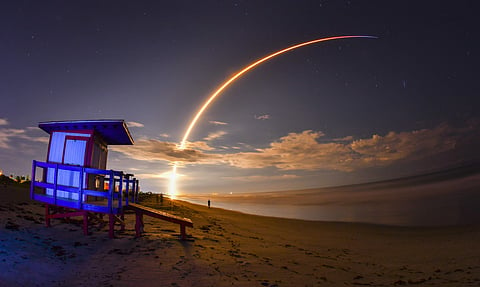

LOS ANGELES: A new startup called SpinLaunch plans to prople rockets into orbit without having to use a chemical engine. It intends to slingshot crafts into space using a novel catapult technology that spins the rocket using a centrifuge. It sounds like an impossible feat, but a physicist has said that it is possible.
Physicist and author Rhett Allain gave a breakdown of the numbers behind the idea in the journal Wired. He says Spin-Launch will need to have a force of about 2.2 million kg to get a 200 kg satellite off the ground.
This force equates to about 10,000 G’s, which means the method is not suitable for human spaceflight. A typical human can only handle about 10 G’s of force, and anyone aboard the craft at that speed would be crushed. Thus, SpinLaunch is focused only on non-passengered craft.
Fuel will eventually be factored into the equation once the craft reaches the outer atmosphere and it will use a chemical engine to get it the rest of the way. A centrifuge handling that type of force and weight spinning around for what is estimated to be about 1.5 hours to gather enough energy sems unlikely.
But Allain says that titanium could work. "I found that a titanium alloy has an ultimate tensile strength of 900 MPa," he wrote. "With that, I can calculate the width of a beam with a square cross section that can support this force."
Allain says that the company’s system will give the rocket a nice boost, but the final velocioty
will need to be much higher. Just to get into lowearth orbit, a craft will have to reach speeds of 27,595 km/hr. So far, SpinLaunch has developed a working prototype of tis launcher which can spin a craft up to 8,000 km/hr.
There are also other factors like air drag which are contingent on the shape of the craft, atmospheric conditions and force that SpinLaunch will have to factor into their research.
According to Allain, however, so far the system appears to be mostly feasible, despite the need for traditional chemical engines. "So far everything seems legit. I mean, you shouldn’t build this in your backyard or anything, but from an engineering standpoint it looks possible," he wrote.